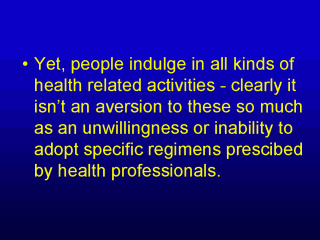 |
And as the slide suggests,
people’s behaviour indicates they are not averse to health-relevant behaviours so much
as being unwilling or unable to follow specific regimens prescribed by health care
practitioners (HCPs). From a psychological perspective, patterns of behaviour are often
cued and thereby controlled, by environmental and social contingencies, or settings. One
reason why behaviour change is so difficult is because the contingencies help elicit
behaviour, This means that most behaviour you demonstrate is evoked by the context within
which it occurs, rather than being a pure and independent act of free will. Consider this:
why are you reading this? Wouldn’t you rather be doing something else? Eating? sleeping?
talking or playing with friends? But you are reading this because the contingencies that
exist around the context of studying elicit certain patterns of behaviour. Why do you
study? Because you have certain goals you want to achieve. Why do you have these goals…?
As you can see, you are inexorably tied into your own social contexts in such a way that
makes changing the patterns of your behaviour rather difficult. Try stopping studying for
six months and see what happens. You would find it very hazardous to your career to do so
and I’m not advocating that you do this. But it serves to illustrate how behaviour is
controlled by our contexts a lot more than we generally acknowledge. |
